Written by Alexandra Young, Humane Pennsylvania Community Outreach Programs Manager
National Feed a Rescue Pet Week was created by Greater Good Charities and The Animal Rescue Site in 2017 to raise awareness that food is one of the most critical supplies of animal shelters and to urge people to donate pet food to their local animal welfare organizations. At Humane Pennsylvania (HPA), as an active partner with The Greater Good Charities GOODS Program and donors like you, we are able to provide comprehensive pet feeding programs:
- We feed the shelter animals an adequate and consistent diet
- We assist pet owners experiencing temporary hardship through Spike’s Pet Pantry
- As the designated County Animal Response Team (CART), we provide basic supplies and food to evacuation centers so owners can stay with their pets during emergencies
Why helping pet owners matters!
 I don’t like to admit it, but as an independent rescuer for decades, I became judgmental of people who struggled to give basic care to their pets. When I met pet owners who did not match my level of pet care, it was easy for me to immediately deem them as uncaring and irresponsible without knowing any further details! However, when I started working professionally in animal welfare, I met people who had the same empathy for the animals, but with far less resources. They were rescuing outside kittens, helping injured strays or inheriting pets from friends/family that can no longer care for them and sometimes, they need a little help.
I don’t like to admit it, but as an independent rescuer for decades, I became judgmental of people who struggled to give basic care to their pets. When I met pet owners who did not match my level of pet care, it was easy for me to immediately deem them as uncaring and irresponsible without knowing any further details! However, when I started working professionally in animal welfare, I met people who had the same empathy for the animals, but with far less resources. They were rescuing outside kittens, helping injured strays or inheriting pets from friends/family that can no longer care for them and sometimes, they need a little help.
Every week at the pet pantry, volunteers and I meet wonderful pet caretakers who are deeply attached to their pets and want to do what is best for them. Just because they cannot feed their pets an optimal diet now does not mean they love the animals any less, nor does it mean they shouldn’t have those pets. For some people, their pets inspire them to get up every day, to power through pain and to think about someone other than themselves.
When our community helps all pet owners, we keep more pets with their loving families and out of the shelters. This, in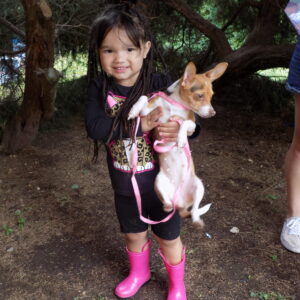 turn, leaves more space at the shelter for the animals that really need a safe place, vet care and possibly a new family (or are reunited!).
turn, leaves more space at the shelter for the animals that really need a safe place, vet care and possibly a new family (or are reunited!).
Years ago, Humane Pennsylvania developed the Animals on Wheels program to ensure pet owners did not sacrifice their own food for their pets. About five years ago, this transitioned to the current Spike’s Pet Pantry as part of the Healthy Pets Initiative department, operating under these principles:
- Respect for the human-animal bond
- Empower all pet owners by being a trusted partner, free from judgment
- Access to accurate information and relevant services & products
- Help pet parents make choices that improve their lives and their pets’ lives
Read more details about Spike’s Pet Pantry here: https://humanepa.org/healthypets/spikes-pet-pantry/
Feeding shelter animals is a big job!
On the flipside, the animals that do come into Humane Pennsylvania Adoption Centers (in Lancaster and Reading) are fortunate enough to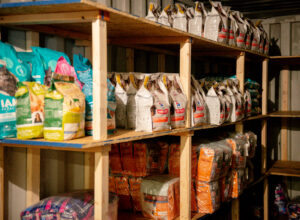 benefit from our organization’s enrollment in a food program that provides the same brand and type of food to everyone. Ongoing participation in this program results in a win-win situation:
benefit from our organization’s enrollment in a food program that provides the same brand and type of food to everyone. Ongoing participation in this program results in a win-win situation:
- Much less digestive upset, associated veterinary care & expenses and stress for the shelter animals
- Improvement in staff morale and ability to care for/handle the animals
- Increased adoptions, resulting in more space for other needy animals
Despite today’s economic roller coaster, if you are fortunate enough to be able to feed your pets “as usual”, please consider making a pet food donation to Humane Pennsylvania. The positive ripple effect of such a donation will directly impact our community, more than you may have realized. Learn more about the Healthy Pets Initiative and how you give back to animals and their caretakers at HumanePA.org.


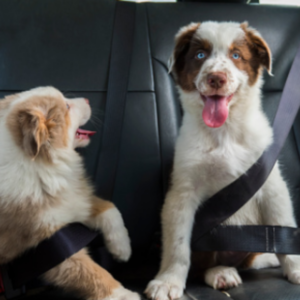 In our area of Pennsylvania, we don’t have to worry too much about natural disasters like hurricanes and tornadoes. However, severe weather here can easily lead to flooding. And no matter where you live, you can be affected by a local water main break or power outages due to high winds and ice storms.
In our area of Pennsylvania, we don’t have to worry too much about natural disasters like hurricanes and tornadoes. However, severe weather here can easily lead to flooding. And no matter where you live, you can be affected by a local water main break or power outages due to high winds and ice storms.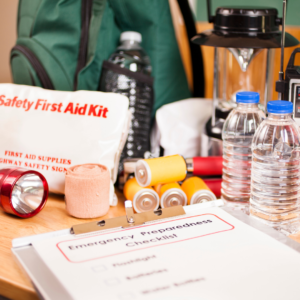 leashes, and/or harnesses, and a favorite toy/scent article. Pack a duplicate bag to keep in the car if you travel often with your pet, and be sure to rotate medications so they stay fresh.
leashes, and/or harnesses, and a favorite toy/scent article. Pack a duplicate bag to keep in the car if you travel often with your pet, and be sure to rotate medications so they stay fresh.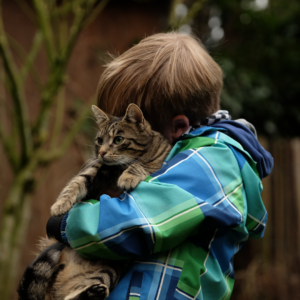 Humane Pennsylvania is home to the Berks County Animal Response Team (CART), which works directly with the Pennsylvania State Animal Response Team (PSART) and serves as the primary Eastern Pennsylvania large-scale emergency distribution resource for pet food and supplies. We are gearing up to deploy emergency supplies for up to 1,500 animals.
Humane Pennsylvania is home to the Berks County Animal Response Team (CART), which works directly with the Pennsylvania State Animal Response Team (PSART) and serves as the primary Eastern Pennsylvania large-scale emergency distribution resource for pet food and supplies. We are gearing up to deploy emergency supplies for up to 1,500 animals.